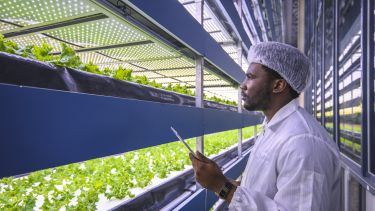Jacob Nickles, Project Manager and Knowledge Exchange Associate at the Institute for Sustainable Food discusses Channel 4 documentary Apocalypse Cow, in which environmental campaigner George Monbiot argues that the biggest problem driving us towards global disaster is how we farm – and particularly how we farm animals.
Overall I agree with most of the content of Apocalypse Cow. There was a heavy focus on disruptive innovations with very ambitious roll-out and commercialisation timelines – with Monbiot claiming that proteins grown in labs by brewing microbes through precision fermentation will be around 10 times cheaper than animal protein as early as 2035.
Such a drastic shift in the food industry has the potential to make way for environmental restoration – with Monbiot advocating the rewilding of vast areas of farmland across the UK – but the programme was severely lacking in consideration of the enormous damage this would inflict on farmer livelihoods, the economy and overall food security.
The programme cited one fantastic example in the Netherlands, where rewilding created five times more jobs from ecological tourism than were lost among farmers – but that model was in a more densely populated country, and located near a city. UK farms will not experience such an opportunity.
I can't help but think Apocalypse Cow’s focus on livestock was very one-dimensional, especially considering Mobiot's overall ecosystem view. I would have liked to have seen greater investigation into protein sources other than cattle, sheep and chicken. We know that ruminants are exceptionally expensive to manufacture – but what about fish or insects?
In terms of land and energy use, micronutrient availability and protein conversion efficiencies, we should be looking to promote fish or insects as an existent and available alternative to meat consumption.
There is a huge body of global work looking at all aspects of agricultural practice to reduce detrimental impact on soil and nutrient use, and increase biodiversity as well as yield. These include deployment of controlled environment technologies such as hydroponics and aquaponics.
The question is this: given that you will not be able to change global consumption of meat within two decades, especially considering the current boom of meat consumption in Asia, why not use active, viable and efficient systems like hydroponics to produce feed for livestock?
Jacob Nickles
Monbiot’s utopian dream would see the entirety of the UK rewilded – but this would shift consumption issues overseas, and we would end up exporting our ecological effects to other nations and reducing our overall food security.
Major and immediate solutions should include: childhood education (which Monbiot briefly touched on with children's books), waste reduction, and change to diets. Monbiot touched on this at the end of the programme with deer consumption, but there are many alternative meat sources which are more nutritionally sound and need to be controlled. Another example is that in Australia, one of the most nutritious and leanest forms of meat is kangaroo, which is not farmed and has been shown to damage ecosystems.
At the Institute for Sustainable Food at the University of Sheffield, we have been considering how nutrient application occurs in the field and developing methods to reduce and reuse these nutrients.
Firstly, nutrient loss from farm run-off and subsequent waterway impact. We are currently exploring methods in which to deploy hydroponic technologies (normally kept in sterile, indoor, controlled environments) on-farm, to "mop-up" nutrient run-off and produce feed stock.
Secondly, we look at overall behaviour change. How do you stop the prevailing theory that eating meat is a social indicator of wealth? To motivate long-term, systemic change and decrease demand for meat, we need to address popular views of health and nutrition and provide all of the information to people so that they modify their beliefs rather than having new methods pushed on them from above.
And we also look at nutritional well-being. We are currently working on ways to bio-fortify plant crops so that they might be more nutritionally beneficial to consumers for less nutritional input.
Overall I thought Monbiot did a good job on Apocalypse Cow, for a limited time scale – though he spent too much time vilifying farmers. At the Institute for Sustainable Food, we are working with farmers and forming knowledge networks in areas such as soil degradation, developing environmentally friendly fertilisers and looking at how we can reduce carbon emissions across agriculture. We appreciate that the food system is large and complex and we are working to make it as sustainable as possible for all of our futures.



